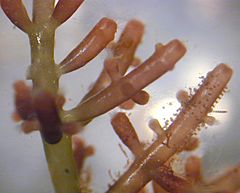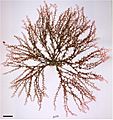Red algae facts for kids
Quick facts for kids Red algae |
|
|---|---|
 |
|
| Scientific classification | |
| Domain: | |
| (unranked): | |
| Phylum: |
Rhodophyta
|
Red algae are a big group of algae that live mostly in water. There are about 6,000 different kinds! They get their name from special reddish colors called phycobilin pigments. These pigments include phycoerythrin and phycocyanin.
Contents
What Makes Red Algae Special?
Red algae are unique because their cells are eukaryotic. This means their cells have a nucleus and other parts, just like plant and animal cells. But, unlike many other living things, red algae cells do not have flagella (tiny tails for swimming) or centrioles (small parts involved in cell division).
How Red Algae Get Their Color and Energy
The special reddish colors in red algae come from pigments called phycobiliproteins. These pigments help the algae absorb sunlight. They work a lot like chlorophyll in green plants. Sunlight is energy, and red algae use this energy to make their own food.
Their chloroplasts are the parts inside the cell that capture sunlight. These chloroplasts are a bit different from those in other plants. They don't have an outer endoplasmic reticulum. Also, their thylakoids, which are like tiny stacks inside the chloroplasts, are not stacked up.
How Red Algae Store Food
Red algae store their sugars as a type of starch. This starch is stored outside of their plastids, which are the parts of the cell that make and store food.
How Red Algae Grow and Reproduce
Most red algae are multicellular. This means they are made of many cells, not just one. They are also macroscopic, which means you can see them without a microscope. Most kinds live in the ocean.
Red algae usually reproduce sexually. Their life cycle is often more complex than other plants. It can involve three different stages, instead of the usual two.
Scientists believe that chloroplasts in red algae first appeared a very long time ago. This happened when an early single-celled organism "ate" a cyanobacterium (a type of blue-green bacteria). This process is called endosymbiosis. The cyanobacterium then started living inside the larger cell and became its chloroplast.
Where Do Red Algae Live?
Most red algae like to grow in warm, tropical, and subtropical waters. You can often find them on shores, just below where the water goes out at low tide. Some types of red algae can also be found in fresh water.
Red algae are used by people too! For example, the food Nori, which is often used in sushi, is made from a type of red algae.
Images for kids
-
Porphyra sp., haploid and diploid (Bangiophyceae)
-
Gracilaria sp. (Florideophyceae: Gracilariales)
-
Some red algae are iridescent when not covered with water
See also
 In Spanish: Algas rojas para niños
In Spanish: Algas rojas para niños









